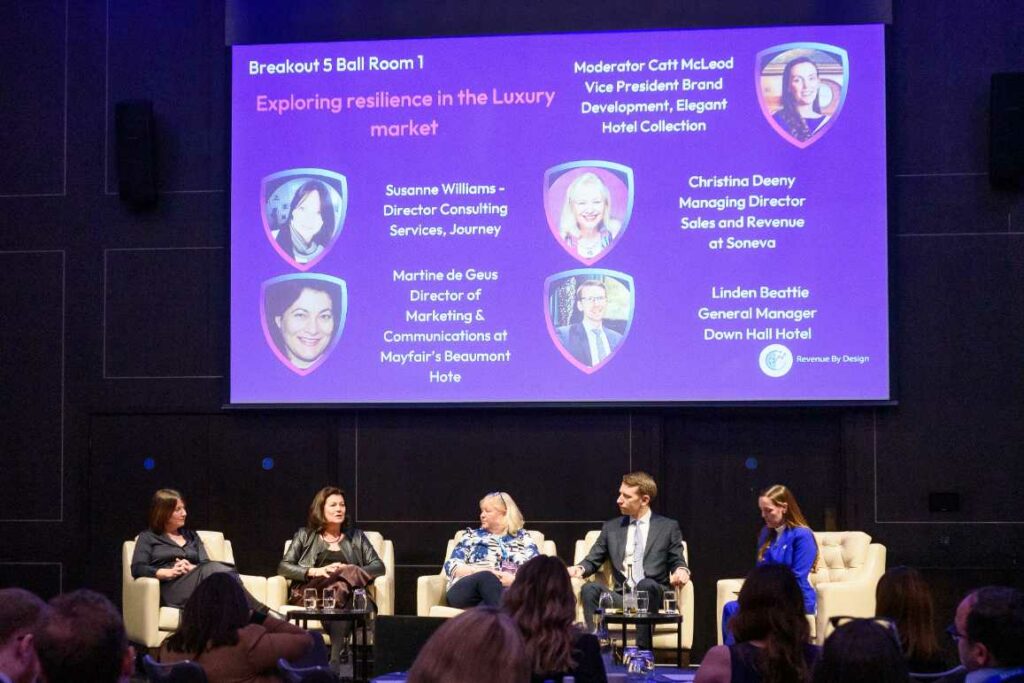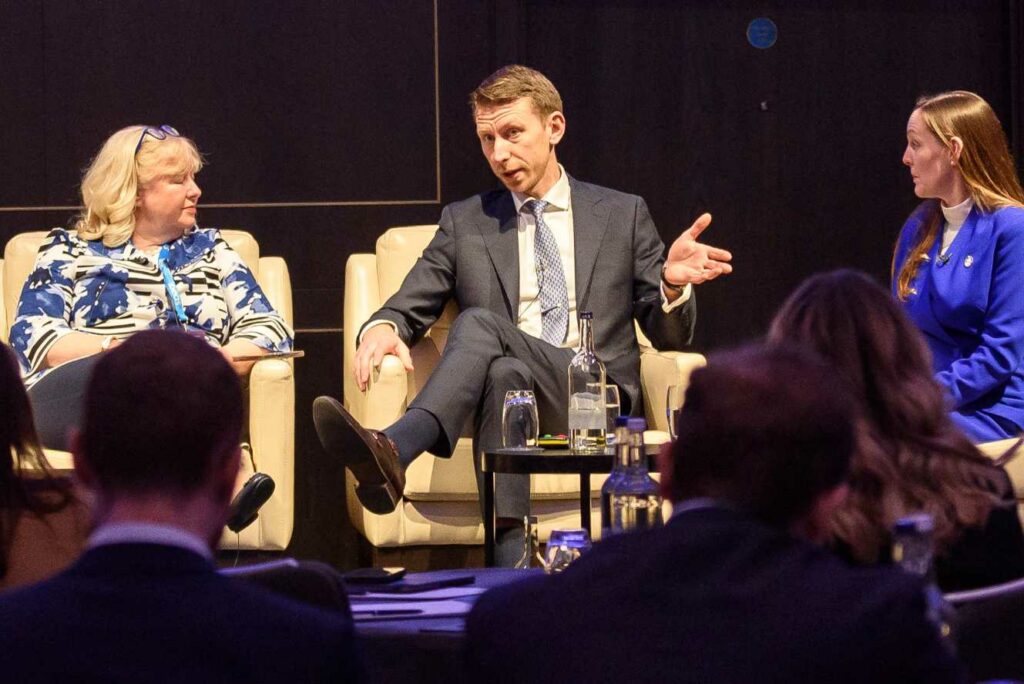The annual Global Revenue Forum has carved itself out as a must-attend date in the commercial hotelier’s calendar – and the 2024 event, ‘Roadmap to Resilience’ did not disappoint. Over 1400 hoteliers across Europe gathered in London, Stockholm, Milan, Lisbon and online to discuss navigating the increasingly unstable economic and political environment we find ourselves in.
With the industry over recent years in survival mode, impacted by a worldwide pandemic, a ‘cost of living’ crisis, political instability, staff shortages and rapidly evolving changes in guest expectations -to name but a few – over 250 hospitality professionals converged at the Hilton London Bankside to debate and unpack their strategies for building resilience when faced with ongoing market volatility, and share measures they are taking to adapt their offering to meet guest’s changing demands and futureproof their operation against what 2024 may bring.
One sector that has boomed despite the challenges that the industry has faced is the luxury hotel sector. The post-pandemic pent-up demand, combined with an increased desire for experiential travel, has seen spending on luxury travel surpass expectations with a projected annual growth rate of 7.6% until 2030, according to a study by Deloitte. But given the ongoing global uncertainty, can such growth last? And what strategies are luxury hoteliers taking to ensure they continue to thrive and remain relevant in today’s unpredictable market?
In front of a packed room, Catt McLeod, VP Brand Development, Elegant Hotel Collection, welcomed a panel of hospitality professionals, all bringing their own very different experiences of working with and for luxury operations, to debate how the sector could best prepare themselves against the challenges 2024 may have in store. Joining Catt on stage was Linden Beattie, General Manager, Down Hall Hotel; Martine De Geus, Director of Marketing, The Beaumont Hotel; Christina Deeny, Managing Director of Sales and Revenue, Soneva; and Susanne Williams, Performance Director, Journey.

Meeting the demand for experiential travel
The discussion kicked off as it should do – with the guest. We have witnessed a much-documented shift in guests’ expectations over recent years, partly triggered by the pandemic, and the panel started off the debate with how they are adapting their offering to meet the expectations of the ‘new luxury’.
All agreed that today’s guests seek more than ‘just a bed’. However, as the demand for experiential travel increases, hoteliers are presented with several opportunities for developing the guest experience.
Soneva, which operates luxury resorts in the Maldives and Thailand, is fortunate to be able to offer a unique approach to experiential travel due to the location of its properties. ’We have combined consumer desire for experiential travel with our sustainability efforts and opened ‘AquaTerra’, a state-of-the-art centre where guests can experience the resort’s conservation efforts first hand,’ said Christina. ‘We also offer tours where guests can see how recycling efforts benefit the local community, in addition to the experiences you would expect from luxury island resorts, such as swimming with manta rays or dolphin cruises.’
Linden explained how Down Hall had tapped into the demand for experiential travel with great success. The hotel has responded to the increased interest in ‘well-being tourism,’ where guests look to their downtime to refresh and recharge, hosting ‘Yoga Retreats’ and ‘Breath Workshops’ which have also proven popular and expanded their reach. In addition, the hotel has hosted a number of events that have proven popular with the local community such as outdoor cinema screenings and a horse hack event that proved to be a huge draw as well as generating some much welcomed and free PR.
The Beaumont Hotel’s central London location means meeting guests’ demands requires a different approach. ‘With 60% of our guests being repeat guests, they look for familiarity when they stay with us,’ said Martine. ‘For them, London is the experience – the theatre, the shopping, the restaurants. Yes, we host events for the local community, such as literary evenings. But for those travelling to experience London, our focus is on providing a familiar environment, familiar faces, and exceptional service – this is key and this is what we have focussed on with success.’
As guests look to create their own bespoke experiences, hotel stays are becoming more complex and Susanne added that it’s more important than ever that the digital offering streamlines the guest journey before arrival. ’There is a huge opportunity even at the booking stage to provide guests with the tools to combine fragmented elements of their stay – spa, workshops, events – into one seamless journey. Hotels should be reviewing the booking journey and looking to make booking these experiences as seamless as possible.’
Changing Market Mix
Given the dynamic and evolving landscape in which we operate, what are hoteliers doing to attract new markets? With the increased interest in self-care, Soneva offers a variety of well-being programmes tailored for those looking to advance their personal health journey. Created by experienced therapists and wellness specialists, guests can benefit from personalised experiences designed to meet their specific health goals, whether that is post-surgery recovery, improved sleep, or a detox programme to leave them feeling refreshed and recharged. Soneva have recently started to offer Stem Cell treatments as part of their medical wellness offering.
While not all hoteliers are experiencing an evident change in market mix, many are experiencing a shift in the nature of the bookings, even from established markets, and are required to adapt their operations to meet these. For The Beaumont, the US market continues to be as important as ever, but there has been a notable increase in multi-generational travel, resulting in an increased demand for interconnecting rooms.
‘There is a myth that being sustainable will cost more’
A conversation about resilience in luxury hospitality today would not be complete without exploring the topic of sustainability. Can you offer a luxurious yet sustainable guest stay? And at what cost to the business?
Catt referenced the Booking.com 2023 Sustainable Travel Survey, which cites 76% of those interviewed intend to travel more sustainably. However, only 43% are willing to pay more for this, and 49% of travellers believe sustainable travel options are more expensive. Therefore, the balance of providing a luxury experience and a duty of care to deliver a more sustainable operation, while still keeping a handle on costs can be perceived as challenging, but that is not necessarily true. ‘There is a myth that being sustainable will cost more, but it doesn’t have to be that way,’ said Linden, saying that even something as simple as replacing single-use toiletries with larger bottles can not only meet environmental goals but can prove more cost-effective for the hotel.
With the added challenge of being a 150-year-old listed building, Down Hall is subject to planning constraints around changes that can be made to the property. But as Linden explained, the challenge is looking at what can be achieved given the confines of your operation. ‘Despite these constraints, we have taken several measures to promote a more sustainable operation. We have looked closely at our supplier base, and consolidated where possible. For example, we now use one wine supplier instead of six, meaning fewer deliveries which is, in turn, kinder to the planet. We have partnered with local suppliers to make our own gin, using botanicals grown on-site. All our tea and coffee are ethically sourced, and we use water from a local spring with our own filtration system. It’s about looking at what is possible given your property’s constraints and guest expectations.’

Leading the way in sustainability for some time now, Soneva became carbon neutral in 2012. Having won numerous awards for their efforts, they have been pioneering a sustainable operation for 30 years, offering guests a luxurious stay and the opportunity to be part of a bigger movement towards a kinder planet. One such initiative is the ‘Waste to Wealth’ programme, where each Soneva resort has its own recycling facility, which sees 90 percent of its waste recycled through an innovative waste management strategy. ‘Guests are now looking to know that when they travel, they are making a positive contribution to the planet and local community,’ said Christina. ‘Guests enjoy knowing they are part of this. They are keen to know they are part of a bigger initiative.’
However, one issue luxury operators face is balancing a commitment to a more environmentally friendly operation with potential pushback from guests who feel they are compromising on luxury. But as Martine explained, there is a lot that can done behind the scenes that won’t impact the guest’s perception of a luxury stay. ‘We have reviewed energy suppliers as we look to be more environmentally friendly,’ she said. ‘We have made changes to the buildings to ensure a more energy-efficient operation by adding solar panels and the like. This can all be done without impacting the guest’s experience.’
Susanne added that while sustainability is not typically seen as ‘sexy’, given its importance to guests, marketing messaging needs to reflect the hotel’s efforts. ‘Hoteliers need to ensure their sustainability journey is woven into their marketing in a natural and engaging way,’ as she encouraged hoteliers to challenge marketing teams and agencies to ensure all sustainability efforts form part of their brand story.
Future-proofing your operation
As the conversation drew to a close, the panel was asked what was the most significant factor they believed would contribute to a more resilient operation in 2024. Susanne cited the importance of accurate data sets in building resilience. ‘With changing markets and changing behaviours, it’s more important than ever to have access to robust data so you can understand your market mix, your guest’s expectations, and their preferred channel of booking, allowing you to adapt your operation and marketing messages to meet their demands.’
The consensus among the hoteliers on the panel centred on the importance of a solid and unified team, ensuring their operations remain well-equipped to confront any unforeseen challenges that may arise in the future. ‘The single most important factor for me is the people,’ said Linden. ‘It’s the team that will future-proof us and give us the ability to adapt, to recover and, most importantly, to grow.’
